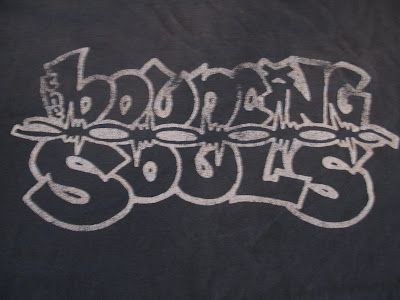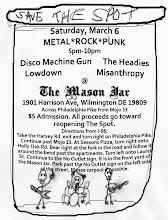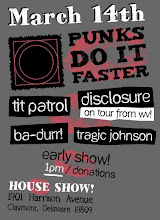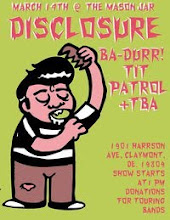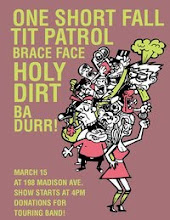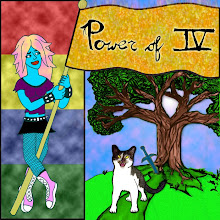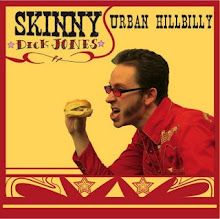The Wilmington, Delaware and West Chester, Pennsylvania punk scene has always had a reputation for being underestimated and revelling in that underestimation. Punk rock, and music and art in general have always depended on a strong and independent middle class for their progress. It's that classic middle class recipe: you don't need to worry about starving, but damn if you like the world or yourself, so you write about it, or paint about it, or whatever. In the 1990's, America's middle class was super-strong, not making huge amounts of money, just experiencing a successful life where the cost of living was rational and fair. Hence, during this time, we experienced a boom of recording, playing out, selling records, and generally being good punk rock bands, really good. As the socio-economical tide turned, many of my cohorts (people in general, not my pallies) abandoned the middle class, sometimes dropping out entirely or, more common, striving for the upper-middle class and above that they believe should be theirs, if they make the right (economically motivated) decisions. Like junkies runnin' dry. The current middle class is in a squeeze, shrinking from both sides. Before the switch over, kids had a little expendable money and decided that DIY punk rock was the area in which to expend it. Of course, while many embrace post-modern economics and dismiss their high-school fantasies, or just stop caring, the esoteric cannot quit it, can't stop won't stop, and oddly enough it is those who remain entrenched in those middle class values and pay-rates, if smaller rates than they would have had in the same situation ten years ago, who carry the torch some say is already extinguished. Art for art's sake and forty hours a week, iron-man style. This is the backdrop for the voice of the area, or the voice underneath the area. A texturous voice, heard loudest cerca 1993-1998, but continuing in some form or another, some true to the original ideals, some musically divergent, but still in and of the fabric that wove Wilmington and West Chester together down Route 202, and sometimes Philly or Jersey.
The best shows today are really good, if never as voluminous (attendance-wise) or far-reaching as say, in 1996. Their are fewer people to be reached, underground music may appear slightly shallow to those born into the "War on Terror". But, for what the local scene has lost in breadth, it has gained in depth, comprised of true-believers, crass and talented, wary and optimistic, with very little to lose and very few poseurs. 9/11 can represent an actual Ground-Zero: in 2001 the most popular "underground" bands in the U.S. were Jimmy Eat World, Modest Mouse, Dashboard Confessional, Thursday, Hot Water Music, etc... and these bands were ushered in as the Next Big Thing after nationally Screeching Weasel, the Queers, Mr. T Experience, the Vindictives, etc... had ruled the non-airwaves. That is, these are the bands that regular people who didn't think they were regular (and were sometimes right) listened to. But the musical and ideological shift is painfully obvious, the two sets of representative bands having ZERO in common, the new-wave combination of accentuating musical complexity over songwriting, and a 180 degree turn in how seriously the artists took themselves. The same exact people were apparently able to relate to both very differing musical styles and all that it entailed. In truth, this newer music was entirely mainstream, using the indy formula that had worked with pop-punk a few years prior, and actually rips out the underground and replaces it again with "alternative". This forced cosmology did alot of damage to the national and local scenes. But in Wilmington, as in America, a new truer underground has risen out of the old, one unburdened by the popularity or drawbacks of attached ideas. People of vision who walk amongst us, at any given show, hiding in plain sight. It is the people who remain from the past scene and all youngin's who also dig it, and the Tao-Boys and Girls who never blinked, or only blinked a little, and (in some cases unconsciously) know what that so-called underground grew out of originally: a near-religious on focus roots fundamentals, accepting all within its temporal tail and rejecting that which makes the piece less, and if possible, doing so ego-blind. What you get then, is the Ramones.
West Chester produced the only band that I would ever say I liked more than the Ramones. Plow United was the apex of our scene, and the watermark by which I am still to some extent, measuring my artistic/punk rock accomplishments. Like many heroes, they were in the right place at the right time, and Plow had to be seen to be believed. They were three-piece plug and play, unpretentious and organic, and their songs were so poppy and wildly edgy at the same time, and all ours, a beautiful contradiction: unwilling to do anything that conflicted with their strict punk ethics and desiring so whole-heartedly to be a successful band. Well representative of a scene which housed some of the most eclectic, entertaining, fast, hard, GOOD punk bands of the 1990's that never went anywhere.
What follows is a damn thorough Wilmington/West Chester Discography. No way it's complete of course, and any/all input would be excellent. This first era will be defined roughly by the time surrounding when Coolidge Records released Plow's "Dance" 7" in 1993 until the final Plow Re-United shows in summer 1998. This is the most prolific and successful time for the scene in general. The second era is a Plow-less universe, where a beacon less scene struggles against the turning tide of taste in America and what that means for their bands. This includes releases from bands who appear earlier on the list, some of which produced their best, most classic material during this period, and many new bands who experienced the scene at its crest only shortly and interpret what that means and how to make musically differently. The third era is roughly from 2004 to today, the rebuilding period in which the participants get to be existential heroes, redefining success for zero marketplace and creating punk rock ex nihilo with much confusion and no debate (and those they play with!). This is a master list, and a lengthy one, I admit, so I'll break it down at my leisure, piece by piece, you know, later on...
Plow "Warped Sense of Humor"
Plow "Dance"
Plow/Tallman split
Plow United/Weston split
Plow United s/t
Plow United "Sadi"
Plow United "West Chester Rock City"
Plow United/Stressboy split
Plow United "Goodnight Sellout!"
Plow United/Throttle Jockey split
Plow United/Ick split
Plow United "Narcolepsy"
Plow United "Dustbin of History"
Buglite "This Day"
Buglite/Bouncing Souls split
Buglite "Marcia Brady Fanclub"
Buglite "Though About You"
Buglite "Sorry to Disappoint You"
Explosive Kate "Playground Trauma"
The best shows today are really good, if never as voluminous (attendance-wise) or far-reaching as say, in 1996. Their are fewer people to be reached, underground music may appear slightly shallow to those born into the "War on Terror". But, for what the local scene has lost in breadth, it has gained in depth, comprised of true-believers, crass and talented, wary and optimistic, with very little to lose and very few poseurs. 9/11 can represent an actual Ground-Zero: in 2001 the most popular "underground" bands in the U.S. were Jimmy Eat World, Modest Mouse, Dashboard Confessional, Thursday, Hot Water Music, etc... and these bands were ushered in as the Next Big Thing after nationally Screeching Weasel, the Queers, Mr. T Experience, the Vindictives, etc... had ruled the non-airwaves. That is, these are the bands that regular people who didn't think they were regular (and were sometimes right) listened to. But the musical and ideological shift is painfully obvious, the two sets of representative bands having ZERO in common, the new-wave combination of accentuating musical complexity over songwriting, and a 180 degree turn in how seriously the artists took themselves. The same exact people were apparently able to relate to both very differing musical styles and all that it entailed. In truth, this newer music was entirely mainstream, using the indy formula that had worked with pop-punk a few years prior, and actually rips out the underground and replaces it again with "alternative". This forced cosmology did alot of damage to the national and local scenes. But in Wilmington, as in America, a new truer underground has risen out of the old, one unburdened by the popularity or drawbacks of attached ideas. People of vision who walk amongst us, at any given show, hiding in plain sight. It is the people who remain from the past scene and all youngin's who also dig it, and the Tao-Boys and Girls who never blinked, or only blinked a little, and (in some cases unconsciously) know what that so-called underground grew out of originally: a near-religious on focus roots fundamentals, accepting all within its temporal tail and rejecting that which makes the piece less, and if possible, doing so ego-blind. What you get then, is the Ramones.
West Chester produced the only band that I would ever say I liked more than the Ramones. Plow United was the apex of our scene, and the watermark by which I am still to some extent, measuring my artistic/punk rock accomplishments. Like many heroes, they were in the right place at the right time, and Plow had to be seen to be believed. They were three-piece plug and play, unpretentious and organic, and their songs were so poppy and wildly edgy at the same time, and all ours, a beautiful contradiction: unwilling to do anything that conflicted with their strict punk ethics and desiring so whole-heartedly to be a successful band. Well representative of a scene which housed some of the most eclectic, entertaining, fast, hard, GOOD punk bands of the 1990's that never went anywhere.
What follows is a damn thorough Wilmington/West Chester Discography. No way it's complete of course, and any/all input would be excellent. This first era will be defined roughly by the time surrounding when Coolidge Records released Plow's "Dance" 7" in 1993 until the final Plow Re-United shows in summer 1998. This is the most prolific and successful time for the scene in general. The second era is a Plow-less universe, where a beacon less scene struggles against the turning tide of taste in America and what that means for their bands. This includes releases from bands who appear earlier on the list, some of which produced their best, most classic material during this period, and many new bands who experienced the scene at its crest only shortly and interpret what that means and how to make musically differently. The third era is roughly from 2004 to today, the rebuilding period in which the participants get to be existential heroes, redefining success for zero marketplace and creating punk rock ex nihilo with much confusion and no debate (and those they play with!). This is a master list, and a lengthy one, I admit, so I'll break it down at my leisure, piece by piece, you know, later on...
Plow "Warped Sense of Humor"
Plow "Dance"
Plow/Tallman split
Plow United/Weston split
Plow United s/t
Plow United "Sadi"
Plow United "West Chester Rock City"
Plow United/Stressboy split
Plow United "Goodnight Sellout!"
Plow United/Throttle Jockey split
Plow United/Ick split
Plow United "Narcolepsy"
Plow United "Dustbin of History"
Buglite "This Day"
Buglite/Bouncing Souls split
Buglite "Marcia Brady Fanclub"
Buglite "Though About You"
Buglite "Sorry to Disappoint You"
Explosive Kate "Playground Trauma"
Explosive Kate "A Dysfunctional Christmas With EK"
Explosive Kate "It's Not Easy Being Stupid"
Explosive Kate/Joy Poppers split
Explosive Kate s/t
Explosive Kate "You Are Not a Winner"
Jake and the Stiffs "Steal This Record"
Jake and the Stiffs "Pot Belly Pete"
Jake and the Stiffs "Spike"
Jake and the Stiffs "I Like Girls"
Halflings "Memory Lapse"
Halflings/Diplomats split
Halflings "Frabba Jabba"
Halflings "A Kiss For Christmas"
The Boils "Hearts of the Oppressed"
The Boils/Sleepasaurus split
The Boils/Violent Society split
The Boils/The Goons split
The Boils "Anthems from the New Generation"
The Boils "When the Sun Goes Down"
The Boils "From the Bleachers"
The Boils/Thumbs Up! split
The Boils "The Ripping Waters"
The Crash "Groovin' Hard"
The Crash "Gary Put Your Glasses On"
The Crash/Ninja Attak split
2.5 Children Inc. "Non Machinable"
2.5 Children Inc. "Courage"
Texas Criffer and Plow United
Dutchland Diesel "No Rules"
Dutchland Diesel "All New Police"
Dutchland Diesel "Staging Grace"
Dutchland Diesel "Jump the Fence"
Explosive Kate "It's Not Easy Being Stupid"
Explosive Kate/Joy Poppers split
Explosive Kate s/t
Explosive Kate "You Are Not a Winner"
Jake and the Stiffs "Steal This Record"
Jake and the Stiffs "Pot Belly Pete"
Jake and the Stiffs "Spike"
Jake and the Stiffs "I Like Girls"
Halflings "Memory Lapse"
Halflings/Diplomats split
Halflings "Frabba Jabba"
Halflings "A Kiss For Christmas"
The Boils "Hearts of the Oppressed"
The Boils/Sleepasaurus split
The Boils/Violent Society split
The Boils/The Goons split
The Boils "Anthems from the New Generation"
The Boils "When the Sun Goes Down"
The Boils "From the Bleachers"
The Boils/Thumbs Up! split
The Boils "The Ripping Waters"
The Crash "Groovin' Hard"
The Crash "Gary Put Your Glasses On"
The Crash/Ninja Attak split
2.5 Children Inc. "Non Machinable"
2.5 Children Inc. "Courage"
Texas Criffer and Plow United
Dutchland Diesel "No Rules"
Dutchland Diesel "All New Police"
Dutchland Diesel "Staging Grace"
Dutchland Diesel "Jump the Fence"
Fondle "Gym Teacher"
Third Year Freshmen "Senior Year"
Third Year Freshmen/Wally split
Tom Martin "Sound of a Wounded Walrus"
Throttle Jockey "At War With Fashion"
Throttle Jockey "Three On a Meat Hook"
Super Hi-Five "A Better Life"
Super Hi-Five/Sacface split
Super Hi-Five "Strength Control Anger"
Super Hi Five/Man Without Plan split
Super Hi-Five "There's No Food Like Dirt"
Super Hi-Five "09/21/99"
Super Hi-Five "Songs For Working"
The Ick "White Trash Trailer Park Girl"
The Ick "All Played Out"
Wally "Eric Clapton is Dead"
Wally "Kill Whitey"
The Orphans - "Anthems for a Doomed Youth"
The Orphans - "Raise the Youth"
Ninja Attak "My First Time"
Corporate Music Bastards "We Only Do It For the Money"
Shoplifters/Kill the Man Who Questions split
Science For Kids "Inches From Destiny"
Johnny X and the Conspiracy "Ruin"
43 "Christie"
Reject "Joe the Hunter"
Mao and the Chinese Revolution "America's Finest"
Brody "Against Forgetting"
Bernie Bernie Headflap "Cheese on Wheat"
Compilations:
"Who Gits Da Deer"
"Dad I Can't Breathe"
Creep Exploitational Sampler
"The Last Stake Has Been Driven"
Matthau Records Comp
"Songs for the Witching Season"
WVUD "Scare Your Roomate"
"Coolidge 50"
Suburban Voice Comp
"So Punk, Barley Visible to the Naked Eye"
"What Are You Lookin' At"
"Destroy the Creep House" vol. 1
"This is My Summer"
Man Without Plan "Commence Primary Ignition"
Man Without Plan "Shop Talk"
Man Without Plan "Get Right"
Man Without Plan "I Feel Badly"
Man Without Plan "The Return of No Point"
Power of IV "Walking Distance"
Power of IV "A Sleight Rebellion Off Madison"
New Dance Show "I Wish My Friends Would Bury You"
Allison Ranger - "Formula Imperative"
Midiron Blast Shaft "Igneous Assertions"
A Year to Forget "Apostasy"
Decade of Error
Rescue the Past
Signal Static
Endless Mike Jambox "Another Hot Freshy-Freshy"
The Bedrockers "Suck Knob on Zero"
Tit Patrol "Robot Pope"
Tit Patrol/Count von Count split
Tit Patrol "A Fackokta Christmas With Tit Patrol"
Tit Patrol "Shut Up Juice"
Count von Count "The Dark Side of the Dune"
Count von Count "Hey Asshole"
The Headies "It's a Super-Man's World"
The Headies/Sexon Horse split
The Headies "Sugar and Spice (and Everything's Fucked)"
The Headies/Terrifica Split
Brian McGee and the Hollow Speed s/t
Tommy Murray "A Broken Sound"
Saturday Night Kids "Total Knockout"
Saturday Night Kids "On Her Satanic Majesty's Request"
Skinny Dick Jones "Urban Hillbilly"
Toothless George "Live in NYC"
Toothless George "Lone Wolf"
Cranked Up!/Neon Maniacs split
Cranked Up! "A Call For Solidarity"
Cranked Up! "This is a Weapon"
Sexon Horses
Grave Mistake
Tragic Johnson
Melon
So if you know someone who should be on the list and isn't, support yer scene and let me know!
Tit Patrol "Shut Up Juice"
Count von Count "The Dark Side of the Dune"
Count von Count "Hey Asshole"
The Headies "It's a Super-Man's World"
The Headies/Sexon Horse split
The Headies "Sugar and Spice (and Everything's Fucked)"
The Headies/Terrifica Split
Brian McGee and the Hollow Speed s/t
Tommy Murray "A Broken Sound"
Saturday Night Kids "Total Knockout"
Saturday Night Kids "On Her Satanic Majesty's Request"
Skinny Dick Jones "Urban Hillbilly"
Toothless George "Live in NYC"
Toothless George "Lone Wolf"
Cranked Up!/Neon Maniacs split
Cranked Up! "A Call For Solidarity"
Cranked Up! "This is a Weapon"
Sexon Horses
Grave Mistake
Tragic Johnson
Melon
So if you know someone who should be on the list and isn't, support yer scene and let me know!





